The Fireman Read online
Dedication
For Ethan John King, who burns bright. Your dad loves you.
Inspiration:
J. K. Rowling, whose stories showed me how to write this one,
P. L. Travers, who had the medicine I needed,
Julie Andrews, who had a spoonful of sugar to help me swallow it,
Ray Bradbury, from whom I stole my title,
my father, from whom I stole all the rest,
and my mother, who introduced me to most of the mycology (and mythology) I relied on to write this story.
Although Draco incendia trychophyton is an invention, my ma would tell you that almost every feature of my fictional spore can actually be found in nature.
Epigraph
Outside the street’s on fire
in a real death waltz . . .
—“Jungleland,” Bruce Springsteen
Though I spends me time in the ashes and smoke
In this ’ole wide world there’s no ’appier bloke.
—“Chim Chim Cher-ee,” Robert and Richard Sherman
It was a pleasure to burn.
—Fahrenheit 451, Ray Bradbury
Contents
Dedication
Epigraph
Prologue: Lit
Book One: Carrying Chapter 1
Chapter 2
Chapter 3
Chapter 4
Chapter 5
Chapter 6
Chapter 7
Chapter 8
Chapter 9
Chapter 10
Chapter 11
Chapter 12
Chapter 13
Chapter 14
Chapter 15
Book Two: Let Your Dim Light Shine Chapter 1
Chapter 2
Chapter 3
Chapter 4
Chapter 5
Chapter 6
Chapter 7
Chapter 8
Chapter 9
Chapter 10
Chapter 11
Chapter 12
Chapter 13
Book Three: Speak of the Devil Chapter 1
Chapter 2
Chapter 3
Chapter 4
Chapter 5
Chapter 6
Chapter 7
Chapter 8
Chapter 9
Chapter 10
Chapter 11
Chapter 12
Chapter 13
Chapter 14
Chapter 15
Book Four: Marlboro Man Chapter 1
Chapter 2
Chapter 3
Chapter 4
Chapter 5
Chapter 6
Chapter 7
Chapter 8
Chapter 9
Book Five: Prisoners Chapter 1
Chapter 2
Chapter 3
Chapter 4
Chapter 5
Chapter 6
Chapter 7
Chapter 8
Chapter 9
Chapter 10
Chapter 11
Chapter 12
Book Six: Phoenix Chapter 1
Chapter 2
Chapter 3
Chapter 4
Chapter 5
Chapter 6
Chapter 7
Chapter 8
Chapter 9
Chapter 10
Chapter 11
Chapter 12
Chapter 13
Book Seven: No Straight Arrow Chapter 1
Chapter 2
Chapter 3
Chapter 4
Chapter 5
Chapter 6
Chapter 7
Chapter 8
Chapter 9
Chapter 10
Chapter 11
Chapter 12
Chapter 13
Chapter 14
Chapter 15
Chapter 16
Chapter 17
Chapter 18
Chapter 19
Chapter 20
Chapter 21
Chapter 22
Book Eight: All Fall Down Chapter 1
Chapter 2
Chapter 3
Chapter 4
Chapter 5
Chapter 6
Chapter 7
Chapter 8
Chapter 9
Chapter 10
Chapter 11
Chapter 12
Book Nine: Engine Chapter 1
Chapter 2
Chapter 3
Chapter 4
Chapter 5
Chapter 6
Chapter 7
Chapter 8
Chapter 9
Chapter 10
Chapter 11
Chapter 12
Chapter 13
Chapter 14
Chapter 15
Chapter 16
Chapter 17
Chapter 18
Chapter 19
Chapter 20
Chapter 21
Chapter 22
Chapter 23
Chapter 24
Chapter 25
Chapter 26
Chapter 27
Chapter 28
Chapter 29
Chapter 30
Chapter 31
Chapter 32
Chapter 33
Delivery
Credits
Acknowledgments
About the Author
Also by Joe Hill
Copyright
About the Publisher
Prologue
Lit
Harper Grayson had seen lots of people burn on TV, everyone had, but the first person she saw burn for real was in the playground behind the school.
Schools were closed in Boston and some other parts of Massachusetts, but here in New Hampshire they were still open. There had been cases in New Hampshire, but only a few. Harper had heard that half a dozen patients were being held in a secure wing of Concord Hospital, looked after by a medical team outfitted in full-body protective gear, every nurse armed with a fire extinguisher.
Harper was holding a cold compress to the cheek of a first grader named Raymond Bly, who had caught a badminton racquet in the face. There was always one or two each spring when Coach Keillor broke out the badminton racquets. Without fail, he told the kids to walk it off, even when they were holding a handful of their own teeth. One of these days she wanted to be there to see him take a badminton racquet in the nuts, just so she could have the pleasure of telling him to walk it off.
Raymond had not been crying when he came in, but when he saw himself in the mirror he lost his composure briefly, his chin dimpling, the muscles in his face trembling with emotion. The eye was black and purple and almost sealed shut, and she knew the sight of his reflection was more frightening than the pain.
To distract him, she reached for the emergency candy stash. The emergency candy stash was a battered Mary Poppins lunch box, rusting at the hinges, containing a few dozen individually wrapped candy bars. There were also a large radish and a potato in there, items she reserved for managing the most serious cases of misery.
She peered inside, while Raymond held the compress to his cheek.
“Hmm,” Harper said. “I think I’ve got one more Twix bar in the candy box and I could really use one.”
“Do I get candy?” Raymond asked in a congested voice.
“You get something better than candy. I have a big tasty radish, and if you can be very good, I’m going to let you have it, and I’ll have the Twix bar.” She showed him the inside of the lunch box so he could inspect the radish.
“Ugh. I don’t want a radish.”
“What about a big, sweet, tasty potato? This is Yukon Gold right here.”
“Ugh. Let’s arm wrestle for the Twix. I can beat my dad arm wrestling.”
Harper whistled three bars of “My Favorite Things,
” pretending to think it over. She was prone to whistling bits from 1960s movie musicals and had secret fantasies of being joined in song by helpful blue jays and cheeky robins. “I don’t know if you want to arm wrestle with me, Raymond Bly. I’m very fit.”
She pretended she needed to look out the window to think it over—which was when she saw the man crossing the playground.
From where she stood, she had a direct view of the blacktop, a few hundred feet of tarmac marked up with the occasional hopscotch grid. Beyond that was an acre of mulch, with an elaborate play set planted in it: swings, slides, a climbing wall, and a row of steel pipes the kids could bang on to make musical gongs (privately Harper referred to these last as the Xylophone of the Damned).
It was first period and no kids were out now, the only time of the day there wasn’t a flock of screaming, rioting, laughing, colliding children rushing about in sight of the health office. There was just the man, a guy in a baggy green army jacket and loose brown work pants, face in the shadow of a grimy baseball cap. He crossed the asphalt at a slant, coming around the back of the building. His head was down and he staggered, couldn’t seem to hold to a straight line. Harper’s initial thought was that he was drunk. Then she saw the smoke coming out of his sleeves. A fine, white smoke poured out of the jacket, around his hands, and up from under his collar into his long brown hair.
He lurched off the edge of the pavement and onto the mulch. He took three more steps and put his right hand on the wooden rung of a ladder leading up into the jungle gym. Even from this distance, Harper could see something on the back of his hand, a dark stripe, like a tattoo, but flecked with gold. The specks flashed, like motes of dust in a blinding ray of sunlight.
She had seen reports about it on the news, but still, in those first moments, she could hardly make sense of what she was looking at. Little candies began to fall out of the Mary Poppins lunch box, rattling on the floor. She didn’t hear them, wasn’t aware she was now holding the box at a crooked angle, dumping out miniature candy bars and Hershey’s Kisses. Raymond watched the potato drop with a fleshy thud and roll out of sight under a counter.
The man who walked like a drunk began to sag. Then he arched his spine convulsively, throwing his head back, and flames licked up the front of his shirt. She had one brief glance at his gaunt, agonized face and then his head was a torch. He beat his left hand at his chest, but his right hand still held the wooden ladder. His right hand was burning, charring the pine. His head tipped farther and farther back and he opened his mouth to scream and black smoke gushed out instead.
Raymond saw the expression on Harper’s face and started to turn his head to look over his shoulder and out the window. Harper let go of the candy box and reached for him. She clamped one hand to the cold compress and put her other hand behind Raymond’s head, forcibly turning his face from the window.
“Don’t, dear,” she said, surprised at the calm she heard in her own voice.
“What was that?” he asked.
She let go of the back of his head and found the cord for the blinds. Outside, the burning man sank to his knees. He bowed his head, like one praying to Mecca. He was engulfed in flames, a mound of rags pouring oily smoke into the bright, cold April afternoon.
The shade fell with a metallic crash, shutting out the whole scene—all except a feverish flicker of golden light, glimmering madly around the edges of the blinds.
BOOK ONE
CARRYING
APRIL
1
She did not leave the school until an hour after the last child had gone home, but even so she was departing early. Most school days she was required to stay until five, for the fifty or so children who hung around for extended hours while their parents worked. Today, everyone was gone by three.
After she shut off the lights in the nurse’s office, she stood at the window and looked out into the playground. There was a black spot by the jungle gym where the fire department had hosed away the charred bits that couldn’t be scraped up. She had a premonition she would never return to her office and look out this window again, and she was right. School was suspended statewide that evening, with assurances they would reopen when the crisis passed. As it happened, it never passed.
Harper imagined she would have the house to herself, but when she got home, Jakob was already there. He had the TV on, turned low, and was on the phone with someone. From his tone—calm, steady, almost lazy—a person would never guess Jakob was in a state of excitement. You had to see him pacing to know he was keyed up.
“No, I didn’t see it myself. Johnny Deepenau was down there in one of the town trucks, pushing the debris out of the road, and he sent us pictures from his cell phone. It looked like a bomb went off inside. It looked like terrorism, like . . . hang on. Harp just walked in.” Her husband lowered the phone, pressed it to his chest, and said, “You came home the back way, didn’t you? I know you didn’t come through downtown. They’ve got the roads all sewed up from North Church to the library. The whole town is crawling with cops and National Guard. A bus exploded into flames and crashed into a telephone pole. It was full of Chinese people infected with that shit, the Dragonscale shit.” He let out a long, unsteady breath and shook his head—as if it shocked him, the nerve of some people, igniting in the middle of Portsmouth on such a nice day—and turned from her, put the phone back to his ear. “She’s fine. Didn’t know a thing about it. She’s home and we’re going to have a good old shouting match if she thinks I’m letting her go back to work anytime soon.”
Harper sat on the edge of the couch and looked at the TV. It was tuned to the local news. They were showing footage from last night’s Celtic game, just like nothing was happening. Isaiah Thomas rose up on his toes, fell backward, and let go of the basketball, hit a shot from nearly half court. They didn’t know it then, but by the end of the following week, the basketball season would be over. Come summer, most of the Celtics would be dead, by incineration or suicide.
Jakob paced in his rope sandals.
“What? No. No one got off,” he said into the phone. “And it may sound harsh, but there’s a part of me that’s glad. No one to pass it on.” He listened for a bit and then, unexpectedly, laughed and said, “Who ordered the flaming pupu platter, right?”
His pacing had taken him all the way across the room to the bookshelf, where there was nothing to do but circle around and come back. As he turned, his gaze drifted to Harper again and this time he saw something that stiffened his back.
“Hey, babygirl, are you all right?” he asked her.
She stared at him. She couldn’t think how to reply. It was a curiously difficult question, one that required a certain amount of introspection.
“Hey, Danny? I have to go. I want to sit with Harper for a minute. You did the right thing, going to pick up your kids.” He paused, then added, “Yes, all right. I’ll send you and Claudia the pictures, but you didn’t get them from me. Love to you both.”
He ended the call, lowered the phone, and looked at her. “What’s wrong? Why are you home?”
“There was a man behind the school,” Harper said, and then a wedge of something—an emotion like a physical mass—stuck in her throat.
He sat down with her and put a hand on her back.
“Okay,” he said. “It’s okay.”
The pressure on her windpipe relaxed and she found her voice, was able to start again. “He was in the playground, staggering around like a drunk. Then he fell down and caught fire. He burned up like he was made of straw. Half the kids in school saw it. You can see into the playground from almost every classroom. I’ve been treating kids in shock all afternoon.”
“You should’ve told me. You should’ve made me get off the phone.”
She turned to him and rested her head on his chest while he held her.
“At one point I had forty kids in the gym, and a few teachers, and the principal, and some were crying, and some were shivering, and some were throwing up, and I felt like doi
ng all three at the same time.”
“But you didn’t.”
“No. I passed out juice boxes. Cutting-edge medical treatment, right there.”
“You did what you could,” he said. “You got who knows how many kids through the most awful thing they’ll ever see in their lives. You know that, don’t you? They’re going to remember the way you looked after them the rest of their lives. And you did it and now it’s behind you and you’re here with me.”
For a while she was quiet and motionless inside the circle of his arms, inhaling his particular odor of sandalwood cologne and coffee.
“When did it happen?” He let go of her, regarded her steadily with his almond-colored eyes.
“First period.”
“It’s going on three. Did you eat lunch?”
“Uhn-uh.”
“Light-headed?”
“Uh-huh.”
“Let’s get some food into you. I don’t know what’s in the fridge. I can order us something, maybe.”
Who ordered the flaming pupu platter? Harper thought, and the room tilted like the deck of a ship. She steadied herself on the back of the couch.
“Maybe just some water,” she said.
“How about wine?”
“Even better.”
He got up and crossed to the little six-bottle wine cooler on the shelf. As he looked at one bottle, then another—what kind of wine did you pair with a fatal contagion?—he said, “I thought this stuff was only in countries where the pollution is so thick you can’t breathe the air and the rivers are open sewers. China. Russia. The Former Communist Republic of Turdistan.”
“Rachel Maddow said there’s almost a hundred cases in Detroit. She was talking about it last night.”
“That’s what I mean. I thought it was only in filthy places no one wants to go, like Chernobyl and Detroit.” A cork popped. “I don’t understand why someone carrying it would get on a bus. Or a plane.”
“Maybe they were afraid of being quarantined. The idea of being kept from your loved ones is scarier than the sickness for a lot of people. No one wants to die alone.”
“Yeah, that’s right. Why die alone when you can have company? Nothing says ‘I love you’ like passing along a horrible fucking fatal infection to your nearest and dearest.” He brought her a glass of golden wine, like a cup of distilled sunshine. “If I had it I’d rather die than give it to you. Than put you at risk. I think it would actually be easier to end my own life, knowing I was doing it to keep other people safe. I can’t imagine anything more irresponsible than going around with something like that.” He gave her the glass, stroking one of her fingers as he passed it to her. He had a kind touch, a knowing touch; it was the best thing about him, his intuitive feel for just when to push a strand of her hair behind her ear, or smooth the fine down on the nape of her neck. “How easy is it to catch this stuff? It’s transmitted like athlete’s foot, isn’t it? As long as you wash your hands and don’t walk around the gym in bare feet, you’re fine? Hey. Hey. You didn’t go close to the dead guy, did you?”

 The Fireman
The Fireman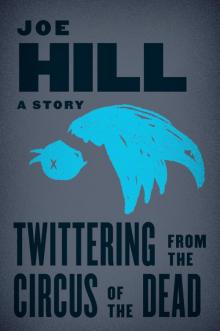 Twittering From the Circus of the Dead
Twittering From the Circus of the Dead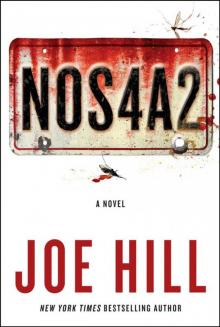 Nos4a2
Nos4a2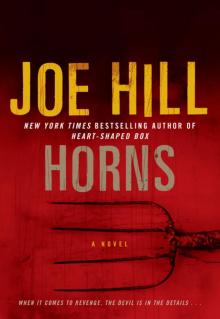 Horns
Horns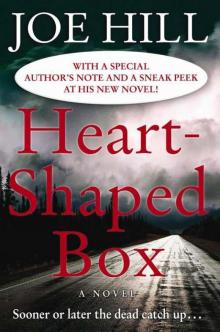 Heart-Shaped Box
Heart-Shaped Box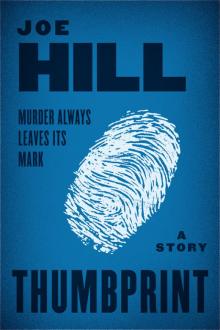 Thumbprint: A Story
Thumbprint: A Story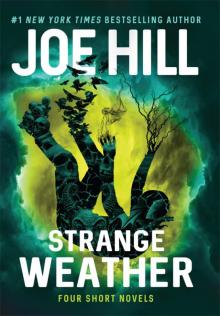 Strange Weather
Strange Weather 20th Century Ghosts
20th Century Ghosts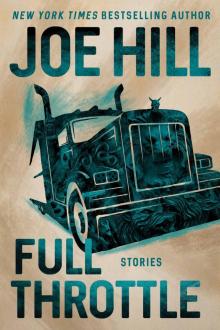 Full Throttle
Full Throttle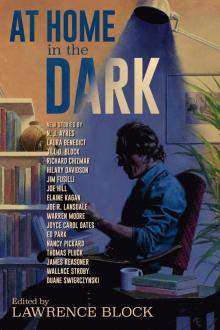 At Home in the Dark
At Home in the Dark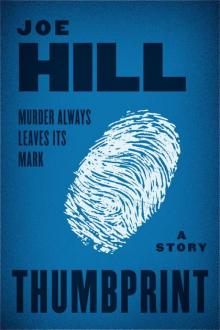 Thumbprint
Thumbprint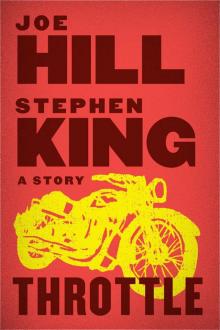 Throttle
Throttle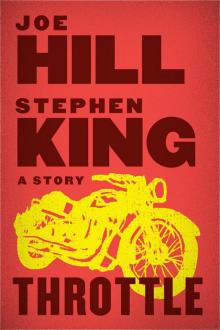 Throttle (Kindle Single)
Throttle (Kindle Single)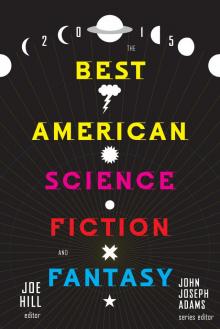 The Best American Science Fiction and Fantasy 2015
The Best American Science Fiction and Fantasy 2015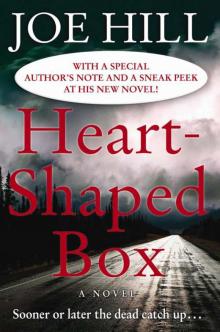 Heart-Shaped Box with Bonus Material
Heart-Shaped Box with Bonus Material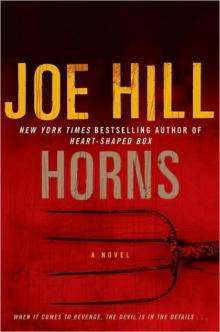 Horns: A Novel
Horns: A Novel